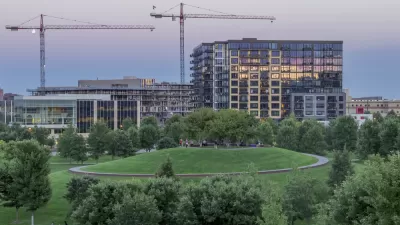Apartment permits declined by 48 percent in the past year in St. Paul. The city’s voters approved one of the nation’s most aggressive rent stabilization ordinances in November 2021.

[Updated June 14, 2023 to accurately reflect the state of Minneapolis’ rent control ordinance.] Apartment construction is quickly declining in St. Paul, bucking national trends and raising questions about the effects of the aggressive rent control policies adopted by voters in 2021.
Frederick Melo reports on new data from the U.S. Department of Housing and Urban Development that show a 48 percent decline in apartment permits in just a year.
“The numbers of permitted units ended the year roughly on par with the city’s 10-year average, which was weighed down coming out of the Great Recession a decade ago. That’s fair, bad or really bad, depending upon how you slice it,” writes Melo.
For local perspective on the decline in construction, Melo notes that neighboring Minneapolis, which advanced its own rent control ordinance in 2021, increased multi-family residential permitting by 16 percent in the same time period. Minneapolis city staff is still drafting that ordinance. Crystal King, a spokesperson for St. Paul’s Department of Planning and Economic Development, is quoted in the article saying that it’s too soon to say why the city’s multi-family development markets are headed in such different directions. As noted by Melo, St. Paul historically has lagged behind Minneapolis’ multi-family construction rates.
And there are significant differences between the rent stabilization ordinances approved in either city. “Opponents of rent control have been quick to point out a key policy difference between the two cities. St. Paul voters approved the city’s first-ever rent-control policy at the ballot box in November 2021, a strict 3% rent cap that was later loosened by the city council last September, with the mayor’s blessing, to exempt new development for 20 years,” writes Melo.
Melo reports more on the fallout from the permitting data, including responses from rent control advocates, in the source article below.
FULL STORY: By HUD counts, St. Paul’s apartment construction permits fell 48% after rent control. Was it temporary?

Maui's Vacation Rental Debate Turns Ugly
Verbal attacks, misinformation campaigns and fistfights plague a high-stakes debate to convert thousands of vacation rentals into long-term housing.

Planetizen Federal Action Tracker
A weekly monitor of how Trump’s orders and actions are impacting planners and planning in America.

In Urban Planning, AI Prompting Could be the New Design Thinking
Creativity has long been key to great urban design. What if we see AI as our new creative partner?

King County Supportive Housing Program Offers Hope for Unhoused Residents
The county is taking a ‘Housing First’ approach that prioritizes getting people into housing, then offering wraparound supportive services.

Researchers Use AI to Get Clearer Picture of US Housing
Analysts are using artificial intelligence to supercharge their research by allowing them to comb through data faster. Though these AI tools can be error prone, they save time and housing researchers are optimistic about the future.

Making Shared Micromobility More Inclusive
Cities and shared mobility system operators can do more to include people with disabilities in planning and operations, per a new report.
Urban Design for Planners 1: Software Tools
This six-course series explores essential urban design concepts using open source software and equips planners with the tools they need to participate fully in the urban design process.
Planning for Universal Design
Learn the tools for implementing Universal Design in planning regulations.
planning NEXT
Appalachian Highlands Housing Partners
Mpact (founded as Rail~Volution)
City of Camden Redevelopment Agency
City of Astoria
City of Portland
City of Laramie





























